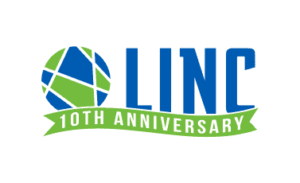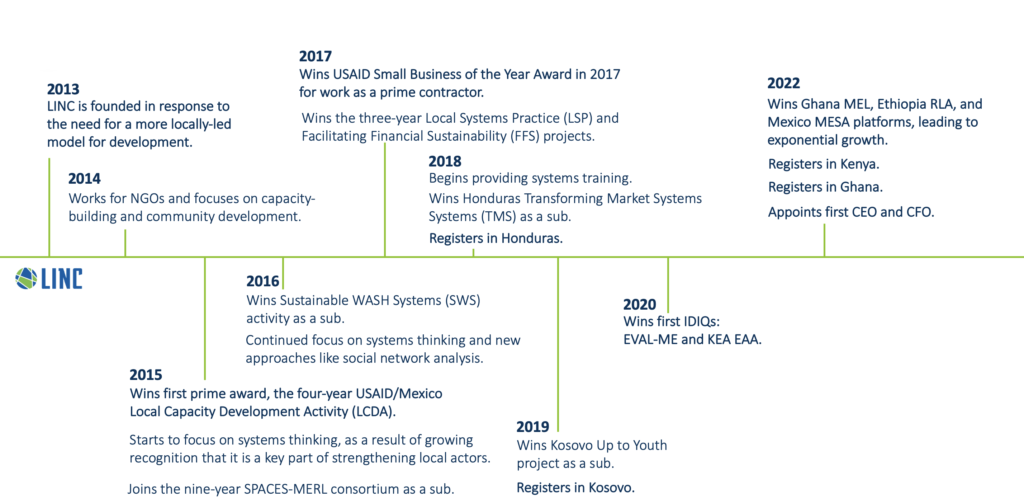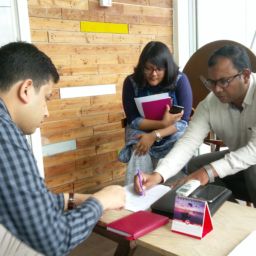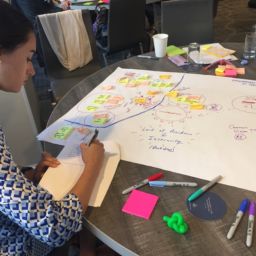This is the first of four blogs LINC is publishing to celebrate its 10th anniversary.
How It All Began
LINC is a mission-driven US-based small business that is committed to empowering local organizations and actors to lead their own development. Going from initially working with national organizations as its only clients, to being recognized as “USAID Small Business of the Year” in 2017, LINC has become a trusted partner to organizations like the United States Agency for International Development (USAID) and the local communities in which we work.

Long-time development practitioners, Rich Fromer and Patrick Sommerville, founded LINC in 2013 in response to the need for a more locally led model for development. In Fromer’s words: “We founded the company because, despite all the rhetoric about locally led and all the good intentions to make it happen, it still wasn’t progressing in any meaningful way because the main metric was money spent directly on local organizations” he added, “and the real incentives, systems, regulations, and processes all continued to encourage status quo.”
With the conviction that real and sustainable development is only possible when it’s led by the very communities and actors affected by it, LINC was established with the Mission to “work alongside local actors to create sustained change”. LINC aims, as our Vision states, “to be a thought leader in improving the effectiveness of social change efforts, willing to challenge the established way of providing aid and to advocate for locally led development. We seek to be a trusted and valued partner and adviser to local actors, funders, and INGOs. LINC is a bridge between research and practice.”
The Early Years
LINC began its work by providing services directly to local organizations. In its first several years, most of LINC’s revenue was generated from local organizations that paid for its services, instead of from traditional donors. Having local organizations as its primary clients at first provided LINC with a unique insight into the needs and challenges that local organizations faced.
During these early years, LINC worked with local organizations in Nicaragua, helping them design projects for the development of the agricultural sector; participated in multiple regional conferences, like the NGO Council of Kenya, to discuss capacity strengthening in establishing partnerships with International NGOs (INGOs) and donors; assisted African networks of non-governmental organizations (NGOs) in their institutional strengthening efforts (see The ADESO Example on the right); and delivered capacity strengthening training to civil society organizations (CSOs) in Mexico and to NGOs in Brazil.
The outcomes from LINC’s work from the early years with local organizations are still visible today. One of LINC’s most successful results has its roots in the 2013 alliance with Fondo Unido Mexico (FUM) (United Way Mexico) to support the capacity building of Mexican Civil Society Organizations (CSOs). Under this alliance, LINC designed and facilitated a workshop on project cycle management for 26 FUM partners.
LINC and FUM’s initial partnership was a success. The positive reception by the participating NGOs led to scaling up the workshops, and in 2015 the United States Agency for International Development (USAID) selected LINC and FUM to implement the four-year USAID/Mexico Local Capacity Development Activity (LCDA). The goal of the LCDA was to deliver a comprehensive national training course (Diplomado) to build the capacity of Mexican CSOs. Under LCDA, the Diplomado was ultimately delivered to 179 Mexican CSOs and 285 executives received diplomas of completion. Access the LCDA Final Program Report here.
The ADESO Example
One of LINC’s first clients was the African non-governmental organization (NGO) African Development Solutions (ADESO). LINC assisted ADESO to undertake a comprehensive review of its opportunities and operating environment and to redefine its strategy for achieving long-term impact and attracting new and diverse funding sources. LINC also supported ADESO’s formation of an internal “Change Management Team”, which helped facilitate an organization-wide process to identify and preserve its core strengths while improving program quality and back-office efficiencies.
Fromer says: “Adeso is a big part of our history of supporting global south NGOs.”
Learn more about LINC’s work with ADESO here.
In 2018, LINC formally transferred the Diplomado to FUM, who has continued to successfully deliver the course with non-USAID funding.
LCDA was LINC’s first funding from a traditional partner. As Sommerville puts it: “As USAID identified a priority for locally-led development, LINC was perfectly situated to play a key role in providing USAID with input and advice on this, derived from our experiences providing services to local organizations for several years.”
Refining our Approach
Due to our work immersed with local communities in Africa and Latin America, the LINC team experienced firsthand the fact that complex development problems are, mostly, unique to their own environments and should be approached with a more holistic perspective, one that addresses their exclusive challenges and opportunities. LINC identified systems thinking as an effective approach to address these challenges. “We saw an opportunity to make more meaningful progress by supporting local actors and systems in a more robust way and applying systems thinking and tools to the complex development problems that local communities face,” said Fromer.
Since then, LINC has applied systems thinking tools to most of its work. LINC has led or participated in several pioneering USAID-funded programs, including the Local Systems Practice (LSP) Activity, the Strategic Program for Analyzing Complexity and Evaluating Systems (SPACES), the Sustainable WASH Systems (SWS) Learning Partnership, the Honduras Transforming Market Systems (TMS) Activity, Kosovo Up to Youth (KUTY) Activity, and the Kenya Global Labor Program – Inclusive Futures (GLP-IF). On these and other programs, the LINC team has led and conducted diagnostics and analyses based on systems thinking tools and has developed, facilitated, and delivered training on systems thinking.
LINC’s team also witnessed the importance of evidence-based decision-making and has become a champion of high-quality data and the need for its careful collection and analysis in development programming and implementation.
Proof of this is LINC’s vast experience conducting rigorous research, such as in the Facilitating Financial Sustainability (FFS) Activity, the Local Organization Market Research in East Africa, and the Collective Action in USAID Programming Activity; and, like the mid-term performance evaluation of the Long-Term Assistance and Services for Research (LASER) activity, the final evaluation of the Local Partner Development activity in Jamaica, and the performance evaluation of the Kenya Accelerated Value Chain Development (AVCD) program, to name a few.
On a greater scale, LINC is currently leading two MEL Platforms, the Ghana MEL Platform and the Monitoring, and Evaluation Support for Adaptation (MESA) Activity in Mexico; and a learning platform, the Ethiopia Resilience Learning Activity.
Some members of LINC’s team
Our People
LINC has enjoyed exponential growth and expansion over the last several years. After being awarded multiple large programs in 2022, LINC appointed its first Chief Executive Officer (CEO), Patrick Lohmeyer, and Chief Financial Officer (CFO), Katie Queen Dossinger; and hired highly qualified technical, project management, and operations staff who are supporting our larger portfolio.
All LINC’s staff members are experts in their field, have diverse backgrounds, experience living in the areas where we work, and are bilingual.
LINC currently has a team of nearly 70 experienced, multicultural professionals and a large network of specialized consultants. Depending on the projects’ needs, LINC partners with American and foreign universities, organizations, and think tanks in the countries where it works.
Today, LINC is legally registered in Ethiopia, Ghana, Honduras, Kenya, Kosovo, and Mexico.
As LINC continues to grow and expand, and as we enter our second decade, we will keep aiming at serving as a trusted partner to funders, local actors, and partner organizations, while bridging the gap between research and practice to achieve sustained locally led development.
This blog was authored by Stephanie Lacouture.




